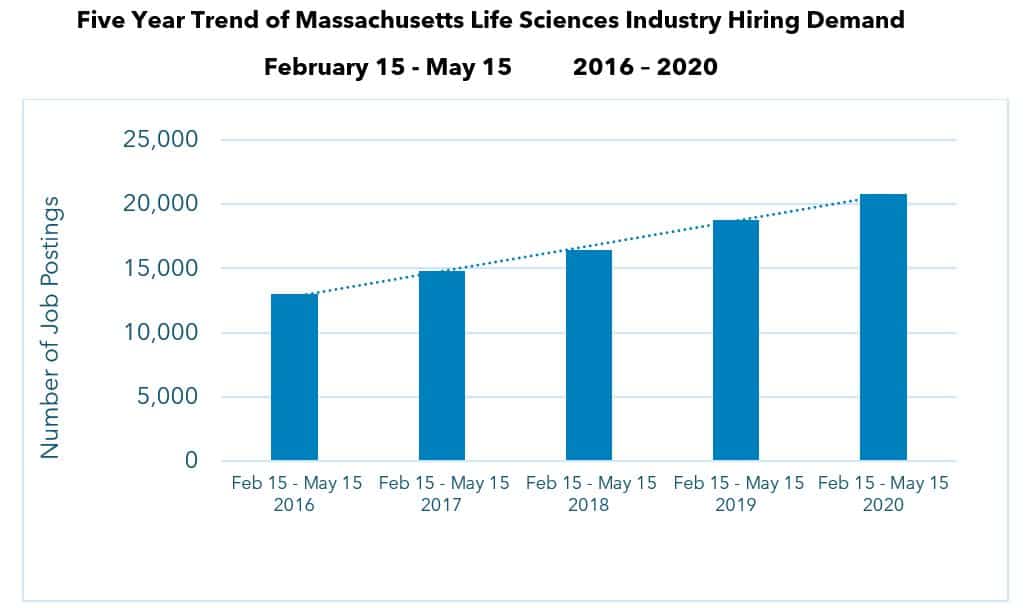
At the end of 2019, MassBioEd released its annual Life Sciences Employment Outlook. Following a multi-year trend, employment was up, hiring demand was at an all time high, and the biggest concern about the life sciences workforce was that the supply of talent was not keeping up with the demand.
Then COVID-19 happened. The importance and relevance of biotechnical innovation has never before been so obvious to so many. The life sciences industry has suddenly become the hope and inspiration of the world. And rightly so.
This disease must be (and can only be) fought in three ways:
- With diagnostics to discover who is carrying the virus and who is not;
- With a vaccine that will give people all over the world immunity to future infection; and
- With a treatment to reduce the suffering of those infected and reduce death rates.
All of these require a skilled life sciences workforce. Doctors and nurses serve valiantly on the front lines of patient care but behind them are legions of scientists and technicians who are working around the clock to learn as much as possible, as quickly as possible, about this virus. There are clinical trial managers designing experiments to validate the safety and effectiveness of potential vaccines and cures. There are computational scientists deciphering the epidemiological patterns arising across the globe. There are engineers reconfiguring manufacturing operations to churn out essential medical devices, diagnostic kits, and vaccines as quickly as possible.
So how has this crisis affected the life sciences workforce? In short, the answer is, it depends. Those who work for companies directly involved in developing products to fight the coronavirus have been busier than ever, and these companies are hiring with renewed vigor. For these workers, new personal protective equipment and distancing protocols were swiftly embedded into daily routine. For those whose work is not directly relevant to this crisis, work has typically continued. Scientists who used to spend most of their time at the bench are catching up on literature and often writing their own manuscripts, work that will contribute to the overall pool of knowledge and have long term positive impacts in other scientific areas. Those who work mostly at a desk are continuing their work from home.
Conversations with leaders in the industry indicate that, in general, most employees are as busy as ever. When asked specifically about hiring, the answer is consistently positive. After a brief adjustment period, human resources and talent acquisition professionals, hiring managers, and job candidates have adapted to virtual interviews and seminars, and remote onboarding.
But anecdotal data must be verified. According to data derived from Burning Glass Technologies Labor Insights, these do bear out.
At first glance, overall demand, as determined by the number of job postings, decreased by a third between early March and mid-May 2020. However, looking at weekly data points over an entire year shows the data are very noisy. In fact, the number of job postings in mid-May increased from the number in early February. Checking hiring demand for the three relevant months over a five year period shows a clear upward trend:

In fact, when normal annual fluctuations are eliminated, there has been a steady upward trend that reveals a 60% increase in job demand over the past five years.
Which functional areas are hiring? There has been little change over the past few years. Positions in clinical research and clinical operations, medical affairs, regulatory affairs remain in highest demand. This year, demand for process development and manufacturing roles are somewhat higher than in the past, most likely a reflection of our Massachusetts companies gearing up to produce diagnostics, vaccines, and potential cures for this new disease threat.
To solve the world’s greatest unmet medical needs, including the novel coronavirus, we need the best and brightest from all over the world. As this data shows, the need for a skilled workforce is paramount to address any and all challenges we face and to lead us through the current pandemic.
For more information on the future of the life sciences workforce, the impact of COVID-19, and hiring and supporting foreign-born workers, register to attend the annual MassBioEd Life Sciences Workforce Conference on June 2-4. The Life Sciences Workforce Conference is free to all. Further details and registration information can be found here.